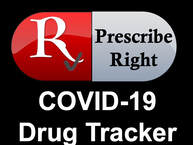|
COVID-19 Vaccines
An FDA review of clinical data for Moderna’s COVID-19 vaccine found evidence supported 94.1% efficacy and no major safety concerns. An age specific breakdown of efficacy found the vaccine to be 95.6% efficacious in patients under 65 and 84.6% efficacious in those 65 and older. Efficacy was consistent across race and ethnicity demographics. The most common ADR were mild-to-moderate pain at the injection site, fatigue, headache, muscle pain, joint pain and chills. Three vaccine recipients and one placebo recipient experienced Bell’s palsy, so the FDA has recommended ongoing monitoring for Bell's once widespread vaccination begins. On 12/17/2020, the FDA’s Vaccines and Related Biological Products Advisory Committee voted 20-0, with one abstention to recommend an emergency use authorization for mRNA-1273 as prophylaxis for COVID-19 infections for patients 18 years and older. Some vials of the Pfizer-BioNTech COVID-19 vaccine contain overfill of the vaccine. The FDA has advised it is acceptable to use each additional full dose in the vials. But partial doses from different vials, should not be combined for a full dose, since the vials are preservative free. The American College of Obstetricians and Gynecologists (ACOG) recommends the Pfizer-BioNTech COVID-19 vaccine should not be withheld from pregnant or lactating women who meet criteria for vaccination based on ACIP-recommended priority groups. A discussion with the patient of the vaccine should include the potential for adverse effects, hand washing and wearing a mask. Patients should be educated that an mRNA vaccine is not a live virus vaccine and no adjuvant is used in the Pfizer-BioNTech COVID-19 vaccine. The mRNA vaccines do not enter the nucleus and do not alter human DNA in vaccine recipients, so these types of vaccines cannot cause any genetic changes. The CDC also discusses mRNA vaccines on a dedicated web page. ACOG recommends the patient’s decision on whether to receive the vaccine should be supported. The CDC has provided interim clinical considerations for the Pfizer-BioNTech COVID-19 vaccine.
Curevac initiated the 36,500 patient, Phase IIb/III, HERALD trial (NCT04652102) in December, to evaluate its mRNA COVID-19 vaccine, CVnCoV, for the prevention of COVID-19 in Europe and Latin America. COVID-19 Antibodies Interim data from 275 patients enrolled in a 6,420 patient, Phase II/III trial (NCT04425629), where treatment with REGN-COV2 lowered viral levels through day 7 to a greater extent at increasing viral loads. The monoclonal antibody appeared to be more efficacious in patients that had not produced antibodies and/or had higher viral loads. Treatment with REGN-COV2 reduced COVID-19 related medical visits compared to placebo (3% vs 6%). COVID-19 Anti-Inflammatories In the NIAID sponsored 29-day, 1,033 patient, Phase III, ACTT 2 trial (NCT04401579), baricitinib added to remdesivir reduced the time to recovery by one day (7 vs 8 days) compared to remdesivir alone in hospitalized patients with moderate to severe COVID-19. The largest effect was seen in patients receiving high-flow oxygen or non-invasive ventilation (10 vs 18 days) NIH did not find enough evidence to recommend for or against use of baricitinib in combination with remdesivir for the treatment of hospitalized patients in cases where corticosteroids can be used instead. If corticosteroids cannot be used NIH recommends use of baricitinib plus remdesivir in hospitalized, nonintubated patients who require oxygen supplementation. NIH found insufficient evidence to support the use of baricitinib in patients already receiving corticosteroids. Except for clinical trials, NIH does not recommend the use of baricitinib without remdesivir. Comments are closed.
|
Stay informed, subscribe to the Prescribe Right Pharmaceutical Pipeline Tracker
Archives
January 2023
Categories |
Services |
Company |
Support |
© COPYRIGHT 2015. ALL RIGHTS RESERVED.
|


 RSS Feed
RSS Feed